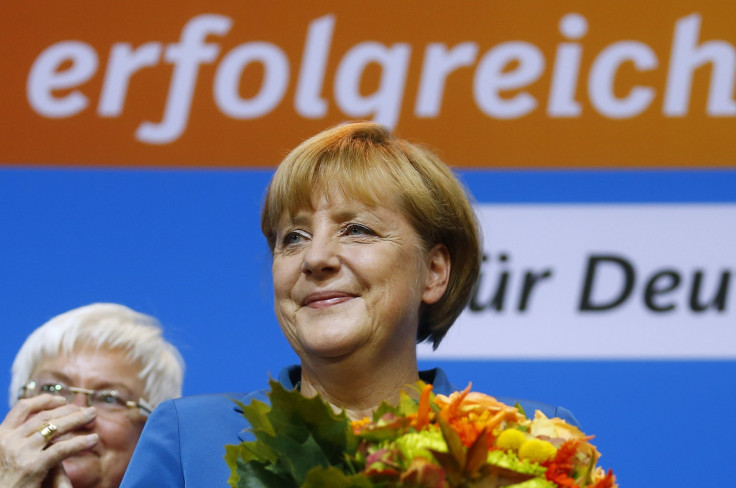Angela Merkel Wins German Election For Third Term

Update 3:50 p.m. EDT: The latest projections have Merkel's coalition falling about five seats short of an absolute majority of 300 in the Bundestag.
This result may make a grand coalition withy the Social Democrats more likely, despite reluctance in the SPD to be junior partners again, because SPD leader Peer Steinbruck has ruled out a coalition the Left party, a descendant of the former East German Communists.
Original story:
German Chancellor Angela Merkel hailed Sunday the “super result” of her center-right party’s victory in the national election, but said it is too soon to discuss what coalition she will form.
Television exit polls showed Merkel's conservative bloc - the Christian Democratic Union and Bavarian Christian Social Union -- winning 42 to 42.5 percent of the popular vote, which if confirmed would be their strongest score since 1990, when Helmut Kohl rode to re-election on reunifying he country. In fact, some projections indicated the CDU-CSU might win an absolute majority of seats and be able to govern alone for the first time since Konrad Adenauer was chancellor in the 1950s. That would be a historic success for the 59-year-old Merkel, whose steady leadership during the euro zone crisis has made her hugely popular at home. The latest projections Sunday night from ARD had the coalition winning 298 – just two short of a majority.
"Dear friends, your cheers show that we've all got something to celebrate about,” Merkel said at CDU headquarters in Berlin, according to Reuters. That's a super result. First of all, I'd like to thank the voters who put such overwhelming faith in our conservative parties. And I'd like to promise the voters that we will act responsibly and with great care. Thank you very much."
But the survival of her center-right coalition with the Free Democrats was in question, with the business-friendly party taking only 4.7 percent, shy of 5 percent mark needed to remain in parliament. The FDP was on track to fall to a humiliating sixth place and drop out of the Bundestag for the first time in 60 years.
Adding to the uncertainty was a new euroskeptic party, the Alternative for Germany (AfD), which stood at 4.9 percent, just a whisper below the threshold needed to enter the Bundestag. Leaders of the upstart party hailed their result while hoping to crack 5 percent and wins seats.
Support for the centre-left Social Democrats (SPD) stood at 26 percent. The environmentalist Greens were at 8 percent, falling behind the hard-line Left party, including ex-East German Communists, at 8.5 percent. Unless she wins a majority or the FDP gets a late bounce, Merkel will almost certainly have to enter coalition talks with the SPD, with whom she ruled between 2005 and 2009.
The SPD’s losing chancellor candidate, Peer Steinbrück, said, according to Deutsche Welle, "We won't do any speculating. The ball is in Merkel's court.”
For his part, FDP leader Rainer Brüderle said, "This is a dark hour for our party. I take responsibility for this defeat.”
© Copyright IBTimes 2024. All rights reserved.





















